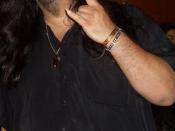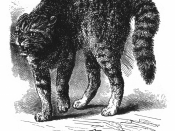GENE FORRESTER Because the novel opens some fifteen years after the main events to be narrated, the first reaction of most readers is to look for what the re- counting means to the narrator. In this case the narrator is Gene Forrester. He returns to the school campus where he spent his years as a student, particularly his sixteenth and seventeenth years, The narration of the events must then be seen as central and important events in the life of the narrator. In his return to the campus, we set'- that Gene is interested in two things-the academic building (or First Building) and the tree which ex- tends over the river. Thus, since he visits these places, we can begin to examine later events in terms of these two places. We later know that Gene's most traumatic experiences occurred in these places. With this information in hand, we are then prepared to examine more fully his basic nature, a nature which is best understood as one in opposition or in contrast to that possessed by Phineas.
In other words, it is almost impossible to analyze the basic elements of Gene's personality without bringing in certain aspects of Phineas' nature. Gene's life has always been one of conformity and obedience to rules and regulations. He has always devoted himself to fulfilling the demands made upon him by his superiors. He prefers to be in accord with rules and accepted behavior at all times. He is not the natural rebel who does things contrary to the dictates of society. Furthermore, he likes to be aware of all the possible implications in any situation before he acts. In general, he is not an individualist even though the person he most admires is an extreme individualist. It is easier for Gene to go with the crowd than it is for him to go against it. Consequently, he is constantly feeling trapped by Finny's active disregard for rules and Finny's impetuous behavior. Gene is basically reserved by nature. He does not like to express directly his emotions. Finny is able to tell him what good friends they are, but Gene cannot bring himself to acknowledge this confession. Even with Leper, he likes to keep the relationship at a distance and is uncomfortable when Leper, discharged from the army, tries to tell Gene about the misfortunes encountered in the service. With these qualities established, we then see that Gene feels the need to set up an ideal. He does so in the person of Finny, who represents everything that is opposite to Gene's nature. Gene then tries to emerge himself within the ideal and when he cannot do so, and when he realizes that there is no rivalry between him and Finny, he cannot stand his own self; thus he tries to destroy the ideal so that it can be brought down to his level. When he cripples Finny, then there is no more ideal and Gene is then able to devote himself to "making it up" to Finny for the terrible betrayal he committed. Thus, Gene is the basic man of conformity who is dissatisfied with his life and tries to establish something more ideal. It is only much later in life that he is able to recognize that man must be himself and assimilate accordingly, and cannot measure himself by the abilities of another person.
PHINEAS (Finny) Finny functions as the perfect ideal young man whose almost perfect nature arouses suspicion. He is the natural-born athlete who moves with perfect harmony, grace, and coordination. He has never been seen to make an awkward movement until he falls out of the tree. This clumsy accident is the first ungraceful action anyone has ever seen Finny make. Finny is a person who responds to the immediate present. He delights in doing things which no one has ever thought of. Most of his actions are spontaneous and result from a momentary decision to do something. For example, it is a sudden inspiration to jump from the tree and it is an unpremeditated decision to go to the beach for the night. Finny, than, is the man of action who is not hampered by rules, conformity, or regulations. Finny is also a person of reversals. He delights in setting up a situation where he is in complete control of everything, but at the same time, he is most delighted when something surprises him. He invents games which involve sudden reversals. He likes people who respond with "unregulated friendliness." He is delighted to be placed in a difficult position so as to see if he can talk his way out of it. Action with Finny is paramount. He does not think of the consequences or of the problems involved in any action. He acts, then, often without thinking. He breaks the school record, but his performance is important only to himself. He will not repeat t!)e same performance for the benefit of an official timekeeper. In other words, he is content with himself as judge or timekeeper . Finny responds to things and people with the same degree of spontaneity and warmth. He is not afraid to express openly his emotions or his feelings to anyone. This is because he is perfectly sure of himself and never fears making a blunder or mistake; He trusts other people with the same degree of faith that he himself expects to be trusted. Consequently, he feels ashamed of himself when he even thinks momentarily that Gene is responsible for his fall from the tree. In general, Finny is the perfectly natural and spontaneous person who is not capable of doing something mean or ugly. He responds to life with natural emotions and all things, except studying, come easily to him. He is not capable of such emotions as jealousy or envy. He lives iri a world of happiness and joy and he communicates these qualities to the people whom he meets.
LEPER (Edwin Lepellier) Leper serves as a contrast to both Gene and Finny. He is the student who seems self-absorbed in his Own affairs. He would have been an unobjectionable citizen of America had the war not come along. He functions in his own private world, but when the war called him forth to function in another type of world, he becomes "psycho" and must be discharged from the service for medical reasons. In contrast to Finny, Leper represents the segment of the world which is not interested in everyday activities. The discovery of a beaver dam is more important than the war or than any sport victory. In contrast to Gene, Leper lives an unregulated life. He is totally wrapped up in his own pursuit of beavers and butterflies, so that when he must convert to a life of conformity and regulations such as is demanded by the army, Leper becomes the psychotic individual.





